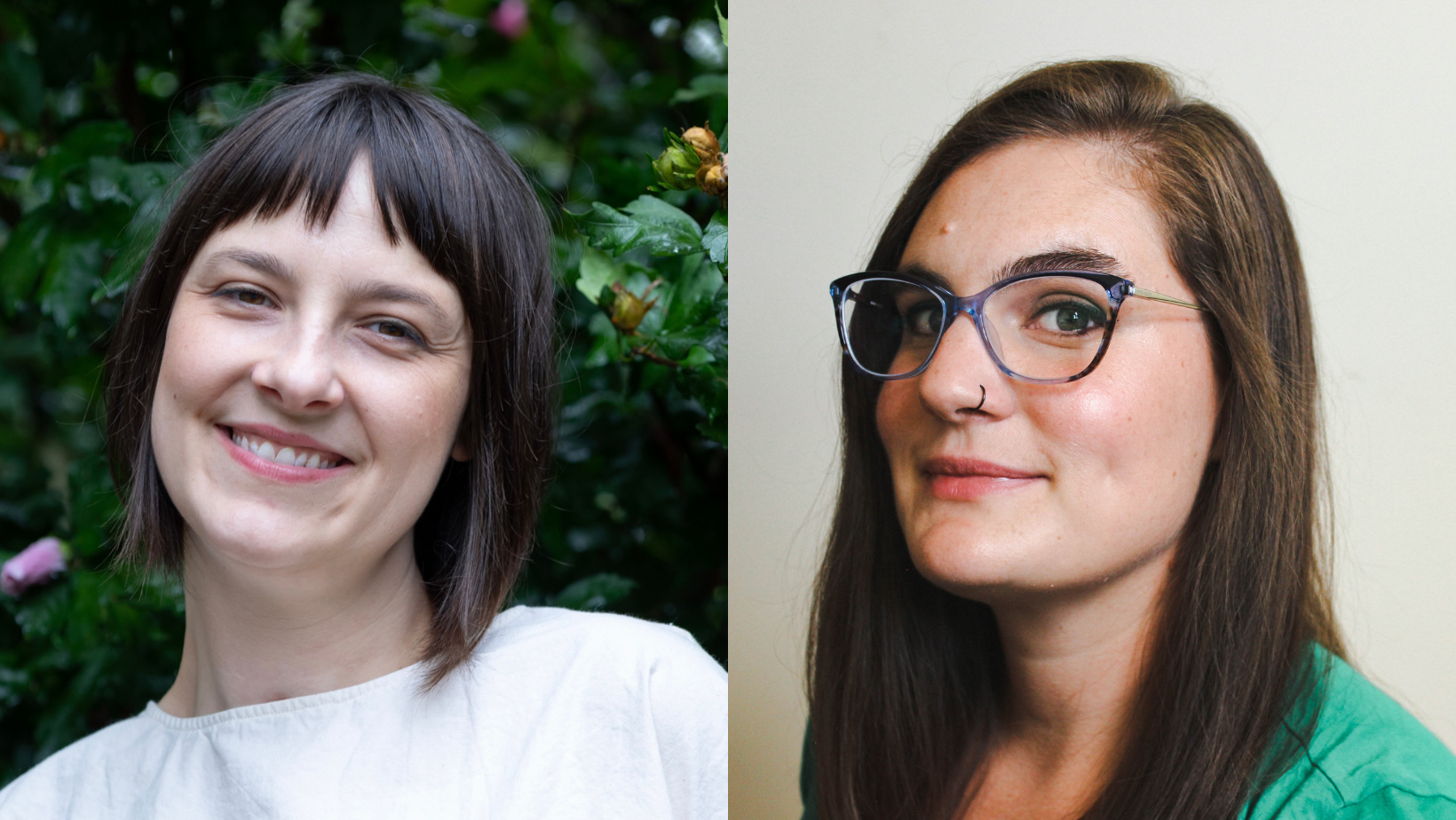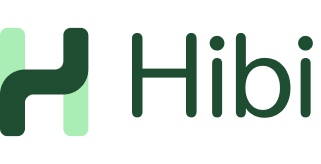
What’s fuelling the Caffeinated Caregivers?
by Melanie Dimmitt
Mar 29, 2024
We chat change-making convos, crowdsourced research and the power of memes with the creatives behind this buzzing community.
What do you get when you cross a storytelling research nerd with a meme-obsessed podcast producer, add in disability parenting and douse generously in coffee? The Caffeinated Caregivers, that’s what. AKA Erica Stearns and Alyssa Nutile.
Since launching their podcast at the end of 2022, these communication pros have used their fast-growing platform to elevate and aggregate a sprawling range of stories from the caregiver community. All while balancing careers and caring for medically complex kids.
Erica, in Southern Illinois, is mother to Margot (7) and Caratacus (5), who share a rare genetic condition. In Erie, Pennsylvania, Alyssa is raising her five-year-old daughter, Gemma, who also has a rare genetic condition, alongside her typically developing, seven-year-old son, Harry.
Erica Stearns and her family
Uncannily, Erica and Alyssa never crossed paths while living in the same small town, where Erica’s family still resides. It wasn’t until they both became parent carers and were connected through friends that their bond began to brew – and Caffeinated Caregivers came to be.
From lol-inducing memes to gritty podcast topics, such as facing uncertain futures, embracing advocacy as self-care and surviving the holiday season, the duo take great care with the content they put out into this space. And as they share in early episodes of the pod, both Erica and Alyssa have lived experience of disability, themselves.
Alyssa Nutile and her children
Listeners will know that conversations between these two always start with the question, what’s fuelling you today? And on this particular evening, Alyssa slurps a smoothie from her signature, oversized glass – or “vase”, as her co-host calls it – while Erica polishes off the cold dregs of her coffee.
Here, the Caffeinated Caregivers give a taste of how they’ve connected with thousands (and counting) through humour, honesty and the need for more awareness around parent carer experiences.
Let’s start by looking back. Was there a specific moment – or maybe phase of life – when you each started identifying as a caregiver (or disability parent, parent carer, medical parent… )?
Erica: I didn’t begin my parenting journey defining myself as anything beyond a mum, or soon-to-be-mum. Then it was NICU mum, then it was medical mum. I was grabbing on to these extra labels for my identity because I wasn’t seeing my experience reflected in the media or in my friends’ lives. It was vastly different from what I expected and what my peers were experiencing.
When our kids are born with disabilities, complex medical conditions or rare diseases, labels are thrown at them pretty quickly. We’re still mum or dad, but we’re going home with a different understanding, a different level of care – and often several machines that don't reflect what many other mums and dads go home with.
It’s okay to feel sad and stressed and overwhelmed while simultaneously feeling joy and at a certain point, in order for me to begin my healing journey, I needed a way to acknowledge and validate that this is different from what everyone else is experiencing around me. I needed language to help me cope and better define for myself that this experience was beautiful and challenging, all at the same time.
Alyssa: I didn’t start calling myself a caregiver until we started our project at the end of 2022. But I had the realisation that I’m a caregiver – and that my parenting journey related to that is remarkably different – much earlier.
My first kid isn’t disabled. He’s typical in every way you can come up with. So through his whole pregnancy, every time we would go to an appointment, it’d be like, “Oh, look at this cute little baby!” And when he was born, everybody was like, “Let me hold him!” You could write fairytale childhood stuff about it. That was him, right?
It couldn’t have been more different with my daughter, Gemma. At the very first ultrasound I went to, they were like, “Oh, something’s not right here”. So all of that happiness and joy from everybody on the periphery – and even from medical professionals during her pregnancy – wasn’t there in the way that it was for my son. Everything around her pregnancy was very stressful and it felt like a lot of things were looming.
I realised pretty quickly that I was going to be approaching parenthood with her in a very, very different way than with my son. Innately and societally, people respect my son as a child much more than they do my daughter. That was clear super, super early.
Alyssa Nutile
Both of you have disabilities and, as such, more familiarity with this space than a lot of us do when we enter via our kids. How does it feel to watch many parents – me included – come crashing in here with negative ideas about disability?
Alyssa: I have a lot of sympathy for those people. I mean, part of the reason people have so much trouble with it is because, yes, your child has a disability and you’re sad about that. But it’s often accompanied by a lot of medical trauma. It’s not like we’re just dealing with new concepts that we’ve never heard of. We’re also in the process of dealing with our own personal trauma. It doesn’t really do any good, in my opinion, to be angry at the way that people are processing that.
Erica: I mean, I think it’s also fair to say that I struggled coming into this. Having grown up with medical complexities and a trach and a G-tube, going to public school and being bullied, and watching my parents not get the support that they deserve, I was scared because I knew what we were up against. I knew that it was going to be fraught with hardship and challenge – that it was not going to be an easy road.
If we really took time to examine why parents get scared, or have a lot of feelings emerge about having a disabled child, it’s probably rooted in this inherent understanding that we’re not going to be well supported. That we’re going to be a part of a marginalised population, that we’re going to be an outlier, that we might struggle to relate and feel a part of a community because for the most part, we’re not seeing that in our communities.
Erica Stearns
Things like your podcast and Instagram community are changing this. How have you grown the Caffeinated Caregivers platform?
Erica: Alyssa and I are planners and we’re very careful and conscientious about what we're putting out there. So this started as a podcast, but didn’t publish an episode until a good year later because we were carefully curating our words. It took time.
Alyssa: We also didn’t expect the Instagram account to take off the way that it did, and become a place where there were so many conversations happening.
Erica: I mean, this all started with Alyssa saying, “We need caregiver memes!”
Alyssa: Our whole idea with the memes was like, okay, how do we get people to talk about topics that we think are important and words that we want to introduce without sounding preachy or self-righteous. And we’re like, with humour! That’s how.
Erica: You want my attention? Give me some solid dark humour that I can relate to and you’ve got it. If there's a lesson in that, even better. So that’s the approach that we’ve taken this entire time.
Then the beautiful thing that happened is our community followed and they started feeding us ideas. Through them sharing meme ideas, they were also sharing their struggles. They were also finding a way to relate to us and others about the hard things they are going through, but in a humorous and light way.
Alyssa: It was a good way to get an idea of what the pulse in the community was just by asking them, “Okay, we’re doing this theme, what are some ideas?”
Erica Stearns and her family
I love how you crowdsource themes to cover in your content from this community. Was this the format you planned on using for the podcast, or did you chance upon it?
Alyssa: Once we launched the Instagram community, in the year or so before we launched the podcast, it went through iterations. First we were like, we’ll have stories. And then we were like, no, we don’t really want to do stories because there are a lot of stories already. So we’ll have expert guests. But then trying to schedule expert guests with our chaotic lives seemed risky.
We settled on this in-between of our personal stories and collective stories for the community. And then on top of that, research. Because something that’s lacking in this community is numbers. There are a lot of anecdotal stories about all these kinds of things, but there’s not a lot of really good numbers anywhere.
When you pull up a lot of studies, the data will come from 50 families at this one hospital in Seattle, right? Their experience gets published and then used to describe caregivers across the country. But it’s not actually telling what the experience is, broadly, for people.
What we’re doing in this community is, okay, how many lived experiences can we aggregate from caregivers?
Alyssa Nutile and her family
Erica: I did a thesis on caregiving and found that caregiver research is still very much isolated to specific areas and hospitals, like Alyssa mentioned. Fortunately, I had a really great mentor in that project who helped me reframe what makes data valid.
Even though a lot of us may not have entered parenthood with a marginalised identity, when you become a caregiver of a child with rare disease, medical complexities or disabilities, you do enter a marginalised group – an oppressed group – and our data is not going to be easily accessible or just out there for the taking. We have to really go out and do creative field research.
What I found interesting with this community – and probably the biggest lesson for me – is that we want it. This community would not exist if we didn't want to talk about our experiences. Caregivers want to feel united in the challenges that they’re facing, because then we can come up with creative ways to solve or navigate them, as well as using appropriate language to share about them. So it’s all connected.
It’s quite overwhelming how many voices we’re hearing from. It’s beautiful – and it’s not at all the same story. There are similarities and common threads, but so many caregivers out there are experiencing very unique challenges and it’s really insightful and important to have that understanding.
Alyssa: I think we do a pretty good job of not just making the space about our opinions. We’re both writers, we’re both communicators, so we spend time shaping narratives from the information and feedback that we’re getting. We’re taking a lot of different experiences into account. It’s not the Erica and Alyssa show – and that’s probably why we didn't name it that!
Erica: I think that is something that is so beautiful about this project and this community. My mum didn’t have that. Alyssa’s mum didn’t have that. And I hear from my mum all the time about how much that was something she wanted. So in a way, I feel like I am living her dream. And I’m proud of that.
Erica Stearns and her family
Find the Caffeinated Caregivers podcast on their website – where you can also find ways to get involved in their upcoming research and advocacy opportunities. Follow the Caffeinated Caregivers on Instagram.







